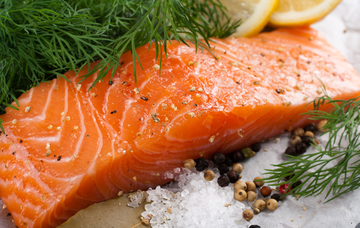
Ask your mother or grandmother to name the most popular diets of their day and you're likely to hear, "Ummmm...Dr. Stillman's, the grapefruit diet and Weight Watchers?" Perhaps they even participated in the heated Atkins vs. South Beach debate period that left battle scars on many perpetual dieters in the U.S.
Today's dieters have an even more confusing and broad range of widely diverse eating plans from which to choose. Sorting through them can be overwhelming because:
- They all make (some) sense
- They all work (for some people)
- Dieters who find success in any one method are typically passionate proponents and dedicated recruiters
Let's look at five popular ones you might hear your friends and patients asking about at book club or your workplace today:
PALEO
Paleo proponents believe that the only way to achieve optimum health and weight loss while minimizing chronic disease is by eating foods similar to those enjoyed by our hunter-gatherer ancestors in the days before agriculture. Animal products are the back -- and rib -- bone of the Paleo diet. The caveat here is that the meat must come from grass-fed or wild meat, fish and fowl. Adherents believe that wild meats contain less saturated fat and supply the heavily coveted omega-3 fats.
In addition to animal proteins, Paleo-ites eat cage-free eggs, fresh fruit and veggies, nuts, seeds, and liberal, healthy oils that include avocado, coconut, olive, and flaxseed. Forbidden no no's are cereal grains, dairy, beans and legumes, potatoes, refined sugars and oils, salt and processed foods.
While it's hard to fault the healthy emphasis Paleo brings to the dietary table, some researchers feel that excluding grains, beans and legumes make the diet nutritionally incomplete, hard to sustain over the long-term and too high in fat.
ANTI-INFLAMMATORY
This eating plan is based on the premise that chronic inflammation is the root cause of many serious illnesses, including cancer, heart disease, diabetes, and Alzheimer's disease. A close cousin of the Mediterranean diet, this plan shares Paleo's emphasis on (limited) lean proteins, healthy fats, and fruits and veggies. But unlike Paleo, the anti-inflammatory menu includes whole grains, pasta, beans, legumes, and high-quality cheese and yogurt. In fact, carbohydrates make up 50 percent of the daily calories on this plan.
This diet offers flexibility and variety, and with reputable organizations and institutions recommending it to help control chronic pain and disease, the anti-inflammatory diet is enjoying a good helping of modern-day popularity.
MEDITERRANEAN
For those who'd rather romanticize their eating plans a little bit, the Mediterranean diet purports to serve up heart-healthy fare with the occasional indulgence of red wine. This plan will have you noshing on nuts, hummus, fish and olive oil as you mimic the cooking style of countries bordering the Mediterranean Sea. With its de-emphasis on red-meat, it is a favorite of those looking to reduce their chances for heart disease, wanting to reduce their blood pressure or improve their LDL cholesterol readings.
Going Mediterranean will have you:
- Eating mostly plant-based foods, such as fruits and vegetables, whole grains, legumes and nuts
- Choosing heart-healthy fish and poultry over red meat
- Eating healthy fats, such as olive oil
- Replacing salt with herbs and spices
- Optionally drinking red wine in moderation (optional)
It should be noted that this diet is seen by many as "a lifestyle change" and not necessarily a way to lose weight, though that can certainly happen. This diet's critics say it can be expensive and it relies on cooking fresh food frequently, which can be difficult, they say.
ALKALINE
Advocates of the alkaline diet believe that blood pH is slightly alkaline, and therefore the optimum diet is composed of primarily alkaline, and not acid-forming, foods. All foods are grouped along a continuum indicating where they fall on the acid/alkaline scale.
Alkaline-forming foods include fruits, vegetables, avocados, and specific nuts and seeds. These choices account for 80 percent of the diet. Acid forming foods such as meats, grains, dairy, and processed foods are limited to 20 percent of the diet.
While this plan is popular in alternative medical practices and frequently used to treat cancer, cardiovascular disease and arthritis, detractors are quick to point out that solid evidence is lacking that demonstrates its ability to heal. Because the alkaline diet excludes whole food groups, some experts believe it results in an unbalanced diet with nutrient deficiencies.
GLUTEN-FREE
A must for those diagnosed with celiac disease or gluten intolerance, this diet has gone mainstream now, with its proponents citing overall better digestive health -- and weight loss -- after strict adherence.
But what the heck is it? A very basic explanation says that the gluten -- a protein found in many foods -- does not jibe well with many of our digestive systems, wreaking havoc on our diets and lives. But if we eat around that protein, our quality of life and health will improve. Some swear by the diet, even though a growing chorus of researchers says the benefits may be suspect for the undiagnosed.
No matter. If it is a plan that works for you, you will find yourself eating a lot of fiber and not an ounce -- nary a one -- of wheat, barley, rye, and other grains and their derivatives. It's complicated, and you should approach this diet armed with your doctor’s advice, consent, and instruction. Like many diets, this one relies on "you can eat this" and "definitely not that" lists to guide devotees safely through the early weeks of adoption. This diet has you eating so few carbs that successful adherents do tend to lose weight. But the products tend to be expensive and hard to find outside major metropolitan areas.
If you think you might be celiac, a blood test is all it takes these days for a diagnosis.
Do any of these plans have you considering a new way of eating? If so, the health care professionals in your physician's office and those who work in wellness programs at hospitals and medical centers are a good bet for additional resources regarding your health decisions. They'll be glad to help you out!
Do you have a favorite diet that's worked for you? Come learn more about health care and how you can motivate patients to be their best at Concorde.
Take The Next Step Towards a Brighter Future
We have a Concorde representative ready to talk about what matters most to you. Get answers about start dates, curriculum, financial aid, scholarships and more!






